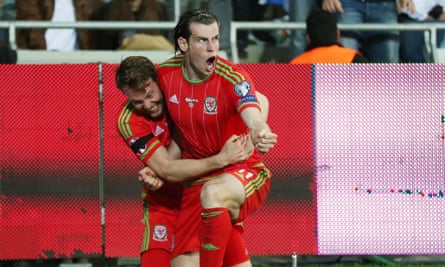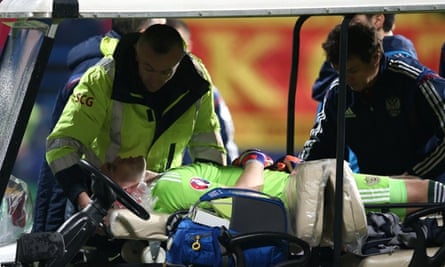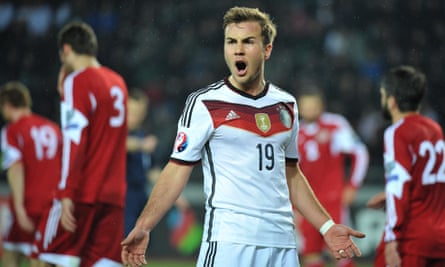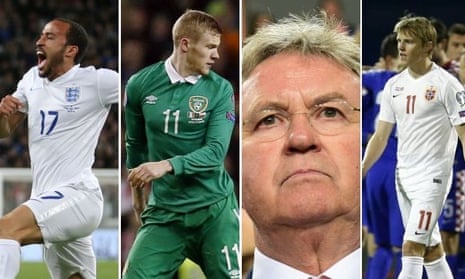1) The stars are aligning for Wales’s golden generation
The road to France is clearing for Wales and things were smoothed further when Belgium held on for a 1-0 win in Israel on Tuesday night. It confirmed Wales’s second place in the group at the halfway stage (two points clear of the Israelis) and gave further evidence that Israel are short of the quality needed to make the top two. Further good news was the red card picked up by Vincent Kompany in Jerusalem, which would mean that he misses what now looks like Wales’s biggest game in years when Belgium visit Cardiff on 12 June. Things are going in their favour, but their quality is coming through now as well and the presence of both Gareth Bale (twice) and Aaron Ramsey on the scoresheet on Saturday augurs well; if Bosnia-Herzegovina, who still entertain hopes of catching Wales from six points behind, have Edin Dzeko and Miralem Pjanic then Wales have these two and arguably greater depth beyond them than their rivals. Joe Allen was outstanding against Israel too, and it is no coincidence that, with Allen and Bale now 25 and Ramsey 24, Wales are hitting form as their biggest talents enter their peak years. A couple of wins from the next four games would probably ensure that things are firmly under control by the time they face Andorra in their last game. Chris Coleman cannot look that far ahead yet, and it would be a crying shame if Wales’s golden generation let this slip, but there is an air of authority that suggests their time is coming. Nick Ames

2) Kompany becoming a liability for club and country
The phrase ‘an uncharacteristic error from Vincent Kompany’ became redundant at some point this season, or possibly even last, as the number of the Manchester City man’s mistakes grew to such an extent that his supporters/apologists could no longer blame Martín Demichelis or Eliaquim Mangala. Kompany had an eventful evening during Belgium’s qualifier against Israel too, firstly going slightly rogue by attempting a few keepie-uppies near the centre circle before launching an implausible volley from around 45 yards that sailed way over the bar – safe to say a pass would probably have been the better option there. And then, with Belgium only 1-0 up, Kompany managed to get himself sent off for two yellow cards, the second coming after losing the ball with a stepover attempt and then trying to retrieve the situation by grabbing Eran Zahavi around the shoulders. Kompany looked stunned by the decision of Mark Clattenburg, but this left his team half an hour to survive in a qualifying match with 10 men, which they did, but it was hardly the work of a responsible captain. This used to be a defender on whom anyone could rely, his mistakes rare and his temperament steady, but not these days – Kompany has now become a liability for both club and country. Nick Miller
3) Crowd trouble is severely harming the Balkans teams
There was no excusing Friday night’s scenes in Podgorica and the Montenegro camp knew it. “My players are completely distraught, all of them are at a loss for words and I also don’t know what to say after all this,” said their coach, Branko Brnovic, after crowd trouble forced the abandonment of their game with Russia. His subsequent assertion that “we now don’t stand a chance [of qualifying for Euro 2016]”, was telling: Montenegro will almost certainly be awarded a 3-0 defeat once Uefa have put their heads together, and further sanctions are not unlikely after an evening whose most disturbing sights were those of the Russian goalkeeper Igor Akinfeev being struck by a flare and carried off on a stretcher. It will leave them at least three points shy of the third place they had occupied and with a rare scent of major tournament football appearing far fainter. Brnovic’s side has been severely hindered by extraneous factors and the same could be said of a Serbia team, packed with promising talents, whose hopes of a place in the top three of Group I look very slim after their own points deduction five months ago. That punishment came as a result of the abandonment against Albania, who now seem nailed-on for an unlikely third-place finish. It does not help to make throwaway conclusions about cause and effect in the Balkans but one simple thing seems beyond dispute: two of the region’s football teams have seen decent shots at a place in Michel Platini’s newly expanded tournament all-but scuppered by the behaviour of poorly controlled crowds. Surely something has to change. NA

4) Is Townsend actually any good?
He’s a strange player, Andros Townsend. He’s a strange concept, really. In theory, he has the tools to be an excellent, genuinely threatening winger, with pace, the ability to beat a man and a rocket of a left foot, so he can often look threatening. The trouble is that more often he isn’t actually threatening, using that pace to run very quickly at a defender, that ability to beat a man to beat a man, and that rocket of a left foot often launches the ball miles into the stands. He’s an astonishingly frustrating player, one who promises much but frequently delivers well, not so much really, and it thus wasn’t a huge surprise to see him out of the Tottenham team for much of the season. Still, Roy Hodgson seems to like him, and having forced his way back into the Spurs team his inclusion in this England squad wasn’t entirely unmerited, even though it went against the views of noted sage Paul Merson, who decreed that Townsend should be ‘nowhere near’ Hodgson’s selection. And he justified Hodgson’s faith with a tracer bullet shot to secure a draw in Italy. He could be a sort of reverse John Barnes: brilliant at international level, not quite so good at club level. Or the new Darius Vassell if you will. All of which leads to the confusing question of whether he actually is any good.
Perhaps we will never know. Townsend himself seems pretty sure, of course. “It’s no secret there was criticism of my call-up, as usual,” he said after the game. “But every time I put on an England shirt I have done myself justice. It was my third goal in seven caps and it was really important that I really did come on and silence a few critics, so I am pleased with my personal performance. I have been thinking about that criticism all week. I have just been desperate to get on the pitch and silence a few critics. As soon as the goal went in, I was thinking of all the people questioning my call-ups and saying I should be nowhere near the England squad.” As the old saying goes, hell hath no fury like an inconsistent winger scorned. NM
5) Will the win against Spain buy Hiddink time?
The natives were restless in Amsterdam on Saturday. And, if we resort to lazy national stereotypes, it takes a fair bit to get the natives in Amsterdam restless. Holland were insipid in the 1-1 draw with Turkey, resorting to the rather unsubtle tactics of chucking the ball into the mixer and aiming for the big man as they chased the game, the big man in this case being Bas Dost. Indeed, they were pretty lucky to get away with a draw, Wesley Sneijder’s shot deflecting in off Klaas-Jan Huntelaar, and that didn’t save Guus Hiddink from the opprobrium of a footballing nation used to rather more refined fare. And yet they pulled a face-saver out of the bag on Tuesday, beating Spain 2-0 thanks to a much livelier performance and goals from Stefan de Vrij and Davy Klaassen. So will this save Hiddink’s position as well as some face? Like being a millionaire, beating Spain isn’t what it used to be, but the result could buy the Dutch manager a little time. The question that presents itself there, is whether that’s good news or not for Holland. NM
6) McClean should have started for Republic of Ireland
Martin O’Neill got it wrong from the start. Lining up in a 4-2-3-1 was the attack-minded set-up almost every Irish supporters wanted to see but few fans will have been happy with Jon Walters occupying a position wide on the right of midfield. He was placed there in the match against Germany and from a defensive point of view, he did a tremendous job. However, he offered little going forward – direct runs and searing pace are not his thing – and a German weak spot, the inexperienced left-back Erik Durm, went unexploited. It was more of the same against Poland. It is obvious to anyone who has seen Poland play in this campaign that they are susceptible to pace on the flanks, so why play the plodder that is Walters out there? Why not start with James McClean? As he showed when he came on, he has the speed and skills to get behind the Poland defence and set up good opportunities for his team-mates. That was not the only choice O’Neill got wrong. If you are going to play Wes Hoolahan, then you need to play Shane Long in front of him. Long has the legs to run on to the type of passes Hoolahan can come up with, unlike the man who was chosen in his stead, Robbie Keane. The LA Galaxy forward was more static than wool fabric and despite his impressive goalscoring record, now looks past his use-by date. Ian McCourt
7) Davis is Northern Ireland’s quiet genius
Before this campaign started the chances of Northern Ireland qualifying for Euro 2016 in an automatic spot seemed as remote as the idea of life being found on Neptune. Should you have suggested such a possibility, people would have laughed in your face. Long and loud and hard. Ha, ha, ha. But the joke could be on them soon enough. With five games to go (three of which are at home and two of which are winnable away fixtures against the Faroe Islands and Finland), Northern Ireland are a point behind group leaders Romania and four points clear of Hungary in third place. Kyle Lafferty’s well-taken first-half goals against Finland (rightly) won him the bottle of champagne but it is worth mentioning the quiet work of Steven Davis. The Southampton player is one of the most crucial cogs in Michael O’Neill’s side. In a team not noted for its ability to keep the ball, he rarely losses possession (he misplaced just two passes on Sunday) and his level-headed approach brings a zen-like calm to the team. He also showed, with his last-ditch tackle on Teemu Pukki, that he has the pace and ability to stop opposition attacks in their tracks. He did not return for the second half due to a thigh injury and his absence was obvious as O’Neill’s side looked a lot more vulnerable. He could be a key figure in France. IMc
8) Odegaard offers scant consolation for Norway
There seems little chance of Martin Odegaard enjoying a quiet couple of years, even if Real Madrid Castilla are watched by crowds that barely scrape 1,500. He was pitched into a far more challenging atmosphere at Zagreb’s Maksimir Stadium on Friday night when 23,000 Croats were given five reasons to raise the roof by an accommodating Norway side, and broke another international record in the process. At 16 years, 101 days, Odegaard became the youngest player to start a European Championship qualifier and completed the entire 90 minutes, performing creditably in the No11 shirt for a generally impotent team and starting the move that led to Alexander Tettey’s consolation goal. The desperation to press Odegaard into such sustained action does not necessarily speak well of the manager Per-Mathias Hogmo’s options but,with four caps to his name, he seems part of the furniture now and could yet end up in the brightest spotlight of all next summer. Encouragement was scant for a Norway side in last week’s 5-1 defeat – with the Croatia coach Niko Kovac even expressing dissatisfaction at his side’s performance – but they still sit four points ahead of fourth-placed Bulgaria and a play-off place appears likely. It is sadly inevitable that a few mediocre teams will sleepwalk into these finals and Norway have as good a chance of going all the way as many; whether it will benefit his development or not, Odegaard seems to be in the international fold to stay and may be required to carry his country’s fight where it counts a year from now. NA
9) Gómez could make a difference to wasteful Germany
No one expected Germany to take anything but three points from Georgia and they did not disappoint. The win was a welcome retort after the draw with Republic of Ireland and the defeat to Poland but it was not quite the perfect retort. “We could have made it easier for ourselves,” said Thomas Müller and he is right. Too often, Germany were profligate up front. Mario Götze did not manage a single shot on goal; Marco Reus hit the bar twice; Müller missed a couple of chances – and almost messed up his goal with a poor first touch – and Mesut Özil, though not noted for his scoring, could have done better on a few occasions. This wastefulness has been a hallmark for Joachim Löw’s side of late. They had 16 attempts against Georgia (with six on target); 19 against the Republic (with eight on target); and 22 against Poland (again with eight on target). Before this game, Löw was asked if he would consider bringing Mario Gómez back into this squad. “We always keep an eye on him,” he said. “If Mario finds his rhythm and is playing and scoring regularly then he’ll obviously be an option looking ahead to the Euros.” With eight goals in his last eight games and Germany proving to be wanton up front, Gómez might just be getting that call sooner than he thinks. IMc

10) This is not the time to be churlish about Gibraltar
The old adage goes that you are at your most vulnerable straight after you have scored a goal, but that might not necessarily have been expected to apply during a Scottish rout of Gibraltar. Lee Casciaro’s accurate low finish, which briefly levelled the scores a minute after Shaun Maloney had put Scotland ahead, did offer some cause for concern and at least provided a riposte to those dismissing the fixture as a waste of time. It is justifiable to wonder how far Gibraltar, whose population does not quite hit 30,000 and who have made the worst-ever start to a European Championship campaign, can realistically go but it jars against the game’s spirit not to share in moments of joy. Casciaro’s goal was heartwarming at the time and celebrated wildly; Gibraltar were brought back down to earth soon enough but scenes like these have a happy knack of cropping up just often enough to postpone more weighty discussions and it will be genuinely interesting to see whether this can be a spur for improvement in the second half of the qualifiers. Their next assignment, a “home” match with Germany in Faro, may not be the best barometer and you suspect that the worst could still be to come for David Wilson’s team – but any non-Scot unable to raise a smile when Casciaro beat David Marshall could do with remembering that these moments define international football just as much as those as the opposite end of the scale. NA

Comments (…)
Sign in or create your Guardian account to join the discussion